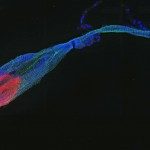Lien vers Pubmed [PMID] – 12797980
Infect. Genet. Evol. 2003 Feb;2(3):185-92
Studying the structure of metapopulations is a new concept in population genetics of infectious diseases that is particularly adapted to the analysis of parasite populations. We considered one application of this theory focusing on Plasmodium falciparum populations. Our study consisted of three main steps: the relevance of the approach, the proposal of a simplified model using metapopulation concepts, and the exploration of the consequences on antimalarial drug resistance. Our main result concerns the metapopulation structure that is appropriate in some real situations. In intertropical rural Africa, parasite populations can be considered to be patchy, comparable to the panmictic situation in which a high transmission rate associated with a high prevalence (generally higher than 50%) implies that no diferenciation occurs between sub populations. In contrast, in Asia and South America, there are great variations in endemicity (with prevalences ranging from 0 to 100%) consistent with a typical metapopulation dynamic structure and a high probability of differentiation between patches. These findings agree with the observed emergence of chloroquine resistance in south-east Asia and South American but not in Africa, and with its rapid spread following its introduction.

